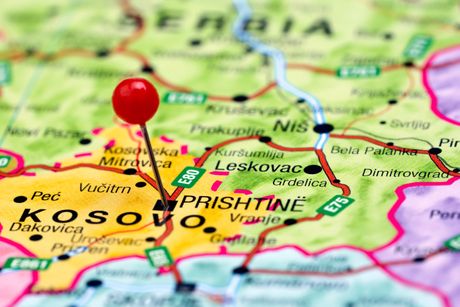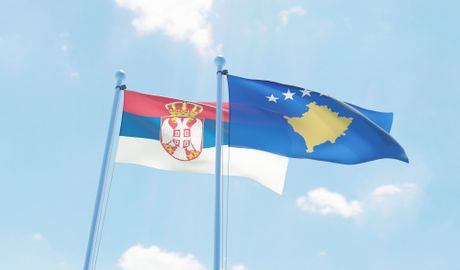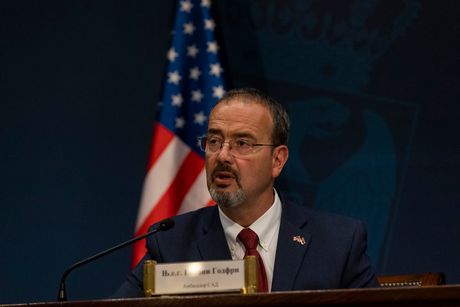Brussels in a hurry, but doesn't provide Kosovo and Metohija answers: Is EU offering "two Germanys"?

Ever since the legally binding agreement on the normalization of relations between Belgrade and Pristina was first publicly mentioned in 2012, no one has managed to figure out what it should mean, but in the meantime it has become a formal condition for Serbia to join the European Union, the daily Novosti writes.
"Without resolving the Kosovo issue, Serbia will not enter the EU, and that is a clear condition," President Aleksandar Vucic recalled.
He also several days ago said that he expects someone to tell us how the agreement on normalization is seen and whether it means recognition of Kosovo or not, and, in case it does, "how they intend to carry that out."
European officials have not yet offered answers to these questions, except for a rush to reach a comprehensive agreement, as German and French Foreign Ministers Heiko Mass and Jean-Yves Le Drian saying in a recent letter that "it is high time to renew the dialogue between Belgrade and Pristina."

EU foreign policy chief Josep Borrell then hinted at some guidelines, saying that "the agreement reached must be acceptable to the international community as well," and that Belgrade and Pristina should agree on a solution, but that "they cannot have their hands untied to agree on whatever they want." It is clear that this refers to the issue of borders, which Borrell says is sensitive, with the warning that any deal will have collateral effect on the region.
However, the issue of recognizing or giving a seat to Kosovo in the United Nations is not openly being ordered to Belgrade at this time.
Political analyst Dragomir Andjelkovic, however, has no doubt that Belgrade is expected to treat Kosovo as an independent state.
"That is the de facto recognition, not the de jure, that is, the way West Germany treated East Germany in the period when they did not have diplomatic relations. That means recognizing all the documents of Kosovo and not disputing its entry into international institutions, which then means the United Nations," Andjelkovic says for Novosti.
Capitulation
He recalls that the Germans presented this model very clearly back in 2007, which is absolutely unacceptable to Serbia:
"We cannot treat our secessionist province as a state, even without recognition. Accepting Ischinger's model within Kosovo's current borders would be our complete capitulation. Serbia must take the position that it is unacceptable and that nobody should harbor illusions that we will agree to it."
As for when Belgrade will be clearly told what is expected of it, Andjelkovic says that since 2007, when this idea was presented, nothing has changed for the better, that it is current and presented to the Serbian side in an informal way, although is not called the Ischinger model.
In the negotiations led by the mediating "troika" of the Contact Group in 2007, Ischinger proposed a model of "two Germanys" which would imply the signing of an interstate agreement on the basis of which mutual relations would be determined without mentioning recognition. That plan was rejected by the then Serbian government and the National Assembly.

Taxes must go away
At a meeting in Belgrade, Foreign Minister Ivica Dacic and US Ambassador in Belgrade Anthony Godfrey expressed disappointment with Pristina's decision regarding the import of goods from central Serbia. According to the MFA, the American ambassador expects that all restrictions would be lifted soon, and the dialogue continued. The situation with Montenegro and the elections was also discussed at the meeting. Godfrey said that he believes that Serbia and Montenegro will resolve all issues through dialogue.
Newspapers did not reach the north
There is enough food in Serbian areas in the north of Kosovo and Metohija, despite the decision of the government in Pristina to ban entry of products from central Serbia that do not bear the "Republic of Kosovo" label. The stores are generally well supplied because the merchants had stocked up. However, Belgrade daily press was unavailable. Bread is mainly produced in the north of Kosovo, in Leposavic and Zubin Potok, so there is no shortage.
Video: Everyone thinks they have the right to talk about a solution for Kosovo and Metohija: Vucic at an international conference
(Telegraf.rs)
Video: Slaven Došlo o mjuziklu "Balkan ekspres": To je priča o malim ljudima koji pokušavaju da prežive
Telegraf.rs zadržava sva prava nad sadržajem. Za preuzimanje sadržaja pogledajte uputstva na stranici Uslovi korišćenja.

